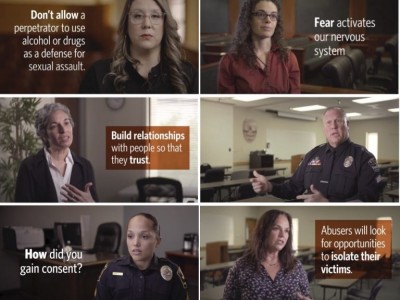AUSTIN, Texas — Law enforcement officers, prosecutors and victims services professionals have a new set of tools to better understand and respond to sexual assault on college campuses and in local communities — just as many students are preparing to return to campus.
The Institute on Domestic Violence & Sexual Assault (IDVSA) in the Steve Hicks School of Social Work at The University of Texas at Austin created five videos that feature law enforcement officers, prosecutors and advocates who work daily with sexual assault survivors and leading scholars in the field. The videos discuss issues as diverse as consent, the neurobiology of trauma, and alcohol and drug use. The training videos were produced with support from the Criminal Justice Division of the office of Gov. Greg Abbott and are being made widely available across Texas and the country.
“These training resources get the right tools into the hands of law enforcement, prosecutors, victim services, and advocates,” said Aimee Snoddy, executive director of public safety for the Office of the Governor. “They help these survivor-serving professionals understand the complexities of sexual assault and the unique importance of each other’s roles.”
Also created and distributed to trained professionals are case decisions that present a factual campus sexual assault case from four different perspectives — Title IX investigator, student conduct officer, university police officer and a campus counselor — along with instructor teaching notes for each case.
The release of these training tools coincides with the reopening of many college campuses where state and national studies show that sexual misconduct is a reality, with students experiencing gender harassment (14%), stalking (13%), cyber abuse (12%), unwanted sexual touching (12%) and sexual assault (6%) at untenable rates.
“When law enforcement, prosecutors, advocates and researchers collaborate and trust one another, the sexual assault response system works better to support survivor healing and increase offender accountability,” said IDVSA Director and University Presidential professor Noël Busch-Armendariz. “These tools give professionals engaging and dynamic learning platforms to better understand the science, myths, psychology, and sexual assault laws — and ultimately student and campus safety.”
The videos focus on five areas:
- Neurobiology of Trauma in Sexual Assault Cases
- Intimate Partner Violence and Sexual Assault
- Alcohol and Drugs in Sexual Assault Cases
- Sexual Assault Response Collaboration
- Sexual Assault and Consent
This effort is part of IDVSA’s Compendium of Resources on Sexual Assault (CORSA) Project, a resource widely available that was developed to enhance coordinated community responses to sexual assault, including briefing sheets, highlighting challenging circumstances faced by law enforcement officers (both campus and municipal), prosecutors, civil legal attorneys, and advocates when responding to sexual assault and the corresponding common misinformation; barriers to investigations, prosecution and advocacy; current science to inform practice; and best practices.


